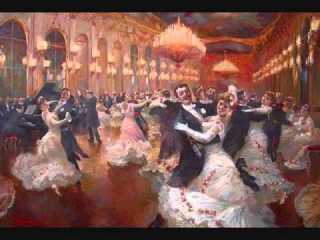On the Hills of Manchuria (Na Sopkah Manchzhurii)
On the Hills of Manchuria (Na Sopkah Manchzhurii)
On the Hills of Manchuria is among the most popular Russian historic melodies, and is widely known abroad as well, having gained the reputation of a “Russian national waltz”. A few decades past its actual creation it was already very often (if not always) labeled as “old-time waltz” on Soviet records, which suggested a kind of ancient folk tune. In fact, this waltz is neither folk nor (even nowadays) very ancient.
On the Hills of Manchuria (Na Sopkah Manchzhurii)
It was composed by Ilya Shatrov, a veteran of the Russo-Japanese war of 1904/05, who was the bandmaster of the Mokshan 214th Infantry Regiment.
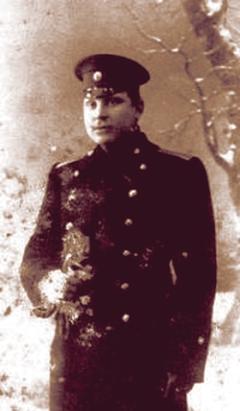
Ilya Shatrov
The Russo-Japanese War (8 February 1904 – 5 September 1905) was "the first great war of the 20th century." It grew out of rival imperial ambitions of the Russian Empire and the Empire of Japan over Manchuria and Korea. The major theatres of operations were Southern Manchuria, specifically the area around the Liaodong Peninsula and Mukden; and the seas around Korea, Japan, and the Yellow Sea.
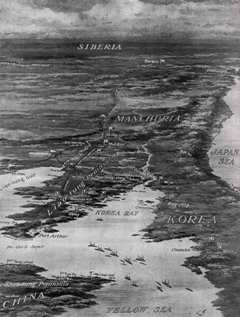
Battlefields in the Russo-Japanese War
The Battle of Mukden (Manchuria) was the final land battle and took place in February-early March, 1905. Casualties were exceptionally heavy (the Russians lost 89,000 out of 330,000, and the Japanese, 71,000 out of 270,000 men).
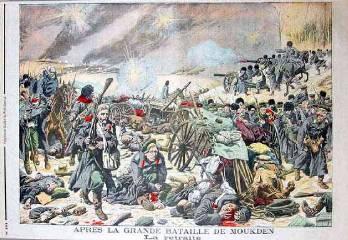
After battle of Mukden
In that battle the Mokshansky Infantry Regiment was encircled by Japanese forces for 11 days, during which it sustained considerable casualties. Shatrov was one of those who succeeded in their break-through. The legend says it was Shatrov with his band who encouraged the Russians for this last break-through on February 27th – the band played battle tunes thus raising the soldiers' morale, and they broke through the encirclement.
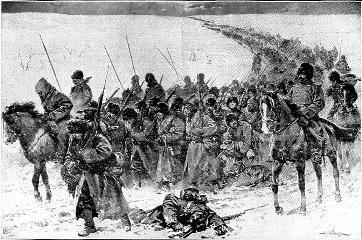
On the Hills of Manchuria
All seven musicians who survived this battle were awarded the highest honors in the Russian army: the cross of St. George. They also received silver trumpets, and Shatrov received an additional military decoration.
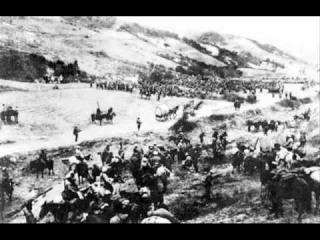
On the Hills of Manchuria
On returning from war in 1906, the Mokshansky regiment was stationed in the town of Samara, where the young bandmaster made the acquaintance of a local music shop owner, one Oskar Knaube (1866-1920), who helped the composer to publish his work. Knaube himself was a composer and publisher of popular music, and in a short time managed to acquire the rights to this waltz. On the Hills of Manchuria achieved colossal success soon after it was composed in 1906, and Knaube boasted of having published some 82 different editions of the song. It was also recorded on gramophone and set in Pianola rolls. The original long title, The Mokshansky Regiment on the Hills of Manchuria, could not be set across the label of the records, so it was shortened to the variant of the name with which the song is known today.
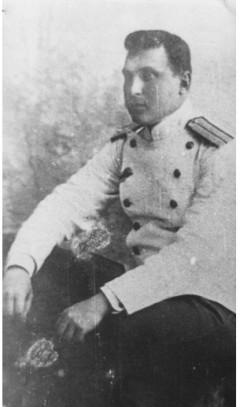
Ilya Shatrov
Recordings of the waltz brought great fortunes to gramophone companies, but hardly anything to the composer. So Shatrov, with the same courage that he displayed at the battlefield, filed a lawsuit against the gramophone companies to re-claim a share of the profits, and, after long proceedings, won the first such lawsuit in Russian history.
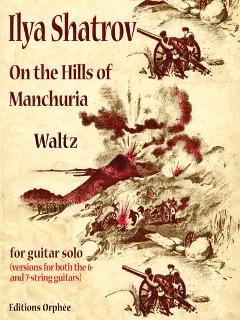
Guitar transcription
A short time after its publication, descriptive lyrics were written for the song, further enabling its wide dissemination by making it available to singers. Actually, there are several sets of lyrics to the song, composed at different times during the ensuing 108 years since its composition, always reflecting a sense of national pride in the magnificent accomplishments of its armed-forces, even though the original song was a commemoration of one of its most spectacular failures.
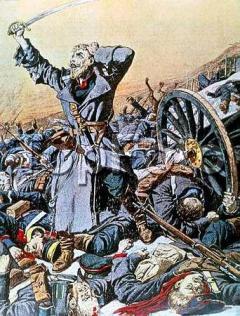
On the Hills of Manchuria
The early versions of the lyrics do naturally reflect the events of the 1904/05 war, mourning the loss of the heroes and turning the song into a dirge (not without a decadent scent) with an appeal for revenge. Such is the first known version, which is commonly attributed to Stepan “Skitaletz” (The Wanderer) Petrov.
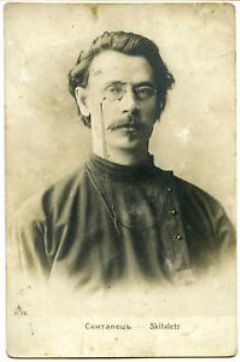
Stepan “Skitaletz” Petrow
Ilya Shatrov pointed that the melody he composed was not a requiem. Some editions even came with his remarks such as “sadness”, “widows’ talk”, “soldiers’ rage” etc. clarifying parts of the waltz. However, as the story of the lyrics shows, it was perceived precisely as a requiem among the people. This was obviously due to the fact that the Russo-Japanese war was a huge defeat for the tsarist Russia. As some scholars suggest, this was the beginning of the decline of the tsarist regime and the onset of the 1917 Revolution.
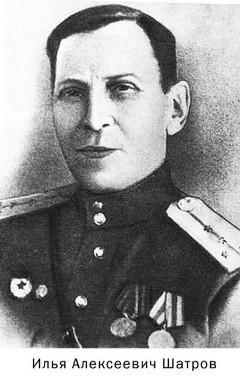
Ilya Shatrov
На Сопках Маньчжурии (Shatrov, Petrov) (Russian lyrics)
Тихо вокруг, сопки покрыты мглой, Вот из-за туч блеснула луна, Могилы хранят покой. Белеют кресты - это герои спят. Прошлого тени кружат давно, О жертвах боев твердят. Тихо вокруг, ветер туман унес, На сопках Маньчжурии воины спят И русских не слышат слез. Плачет, плачет мать родная, Плачет молодая жена, Плачут все, как один человек, Злой рок и судьбу кляня!... Пусть гаолян вам навевает сны, Спите герои русской земли, Отчизны родной сыны. Вы пали за Русь, погибли вы за Отчизну, Поверьте, мы за вас отомстим И справим кровавую тризну.
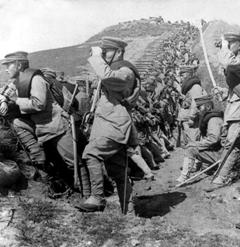
On the Hills of Manchuria
The Hills of Manchuria (Music by I.A. Shatrov, lyrics by S. Petrov)
Around us, it is calm. Hills are covered by darkness. Suddenly, the moon shines through the clouds, Graves hold their calm. The white glow of the crosses—heroes are asleep. The shadows of the past circle around, Recall again anad again the victims of battles. Around us, it’s calm; the wind blew the fog away, Warriors are asleep on the hills of Manchuria And Russian weeping is canot be heard. Dear mother is shedding tears, The young wife is weeping All like one are crying, Cursing fate, cursing destiny! Let kaoliang’s rustling lull you to sleep, Rest in peace, heroes of the Russian land, Dear Fatherland’s sons. You fell for Russia, perished for Fatherland, Believe us, we shall avenge you And celebrate a bloody wake
